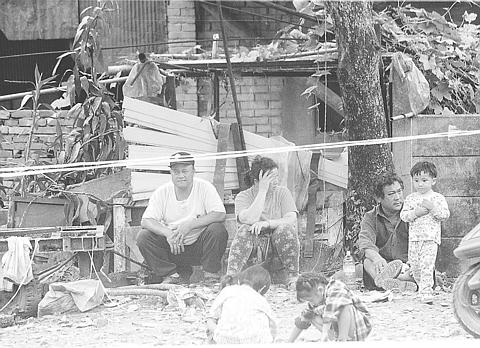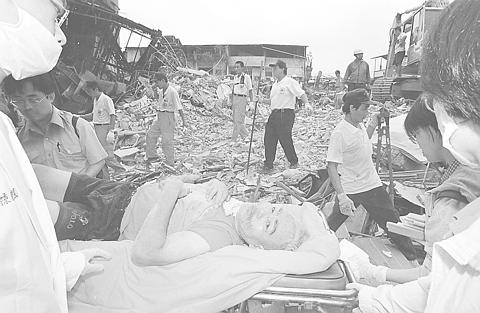As the dust settled in Puli from the worst earthquake in Taiwan this century, the town's many dispossessed residents are slowly coming to terms with the difficult future that awaits them.
Families camped outside their broken and destroyed homes have to deal with not only the fear, shock and trauma from the earthquake, but also the powerful aftershocks that continue to shake the ground around them.
Most have set up camps in open-air spaces, scattered throughout the town, in parks and in schools.

PHOTO: LIN CHENG-KUNG, LIBERTY TIMES
There is really no other place for them to go where they can feel safe, said Liao Yu-chen.
Liao was sitting in the playground of Puli's elementary school yesterday, surrounded by scores of other families facing a similar plight.
"When the quake hit, it felt like the end of the world," Liao said, describing her feelings on the night the earthquake destroyed the town.

PHOTO: CHANG YING-YING, TAIPEI TIMES
Luckily, she was able to get her family out of their home, which split nearly in two.
Now Liao, like many others, is stuck. She cannot return to her destroyed home, but is frightened to leave Puli.
"The roads are terrible -- I wouldn't go anywhere," she said. "Not only that, but aftershocks are a concern."
Just yesterday morning, Liao returned to her home to retrieve a gas cooker. But as she did, an aftershock hit again.
But yesterday, for thousands like Liao, there was a glimmer of hope. Rescue helicopters came and went several by the hour, bringing in food and water and taking away the injured.
Premier Vincent Siew (
They soon discovered that the damage in Puli is much more serious than the government initially estimated.
"It wasn't until 30 hours after the earthquake that we realized the extent of damage that had been sustained," said government spokesman Chen Chien-jen while visiting Puli.
"We were prepared, but in retrospect there was more that could have been done."
He said the government was now focusing on three immediate goals -- an urgent need to handle the bodies of those who lost their lives, shelter and tents for survivors who lost their homes, and for roads to be cleared of debris.
The government has also announced a relief budget of NT$3 billion -- as well as NT$1billion in immediate aid for Nantou, and another NT$1.5 billion for Taichung County.
Chen also said the government would be looking into the structural integrity of the affected buildings to find out why they had collapsed so easily.
Some buildings, he said, were not up to standards, pointing to the fact that many newer buildings had been destroyed.
"Those responsible should be investigated," he said.
At the Taichung veteran's hospital ambulances streamed in, bringing injured people lifted by helicopter from Puli.
A 32-year-old woman, her head wrapped in bandages, said she was in the town of Chongshi when the earthquake struck and the ceiling fell on her.
She was trapped for an hour before being rescued, but had to endure a 10-hour wait before she was taken to a hospital. She said her husband was suffering from exposure
The hospital, a mess on Tuesday as it struggled with the stream of patients, was operating normally yesterday but was packed with the injured.
In neighboring Yunlin County, US search and rescue workers combined their efforts with a local team in Touliu City, about 60km west of Puli, to save people trapped in two toppled buildings.
Workers had made contact with a 33-year old man, Hsu Tse-tai (許澤泰) a novelist, who was stuck beneath what remained of a 16-story building that had sunk five floors when it collapsed on Tuesday.
The workers were able to communicate with him, and had even fed him intravenously, as well as given him oxygen, into the small space within which he was trapped.
Last night his brother came down from Taipei to see if he was okay. There was rescue work going on the other side of the building, but his brother began to move through the rubble to where he thought the apartment would have been.
After some effort, he removed some debris, and started to call out his brother's name, and his brother called back (at 1pm yesterday), and have been trying to get him out ever since. His leg is pinned down by a slab of concrete. At press time last night, rescuers were chipping away at the slab and were confident of freeing him.
International rescue teams began arriving in Taichung yesterday.
Sccording to one member of the USAID team, the help that was being provided was, in his opinion, the best-organized that the group has encountered in its work abroad.
All three of the buildings that collapsed in Touliu were built by the same construction company, which declared bankruptcy over a year ago.
The other building had sunk deep into the ground, and the extremities of the 12-story apartment complex had split open, leaving a huge gaping hole in the middle, exposing metal rebar and concrete.
It was believed that at least four people were still trapped inside a complex that had housed 236 residents. Twenty survivors were pulled out, and another seven bodies were recovered.
But while rescue teams have managed to reach areas like Tou-liu and Puli, some areas remain cut off from the outside.
Aid has come too slowly, said Chung Lin-tong, a farmer who lives in Niomen outside of Puli.
Chung, along with his son came to Puli by motorbike to get milk powder for his newborn eight-month-old child. He and his family are living in their car outside of their country home which is no longer safe to live in. When the earthquake hit, Chung said, he had only one thought, "get my family and get out of the house."

DAREDEVIL: Honnold said it had always been a dream of his to climb Taipei 101, while a Netflix producer said the skyscraper was ‘a real icon of this country’ US climber Alex Honnold yesterday took on Taiwan’s tallest building, becoming the first person to scale Taipei 101 without a rope, harness or safety net. Hundreds of spectators gathered at the base of the 101-story skyscraper to watch Honnold, 40, embark on his daredevil feat, which was also broadcast live on Netflix. Dressed in a red T-shirt and yellow custom-made climbing shoes, Honnold swiftly moved up the southeast face of the glass and steel building. At one point, he stepped onto a platform midway up to wave down at fans and onlookers who were taking photos. People watching from inside

MAKING WAVES: China’s maritime militia could become a nontraditional threat in war, clogging up shipping lanes to prevent US or Japanese intervention, a report said About 1,900 Chinese ships flying flags of convenience and fishing vessels that participated in China’s military exercises around Taiwan last month and in January last year have been listed for monitoring, Coast Guard Administration (CGA) Deputy Director-General Hsieh Ching-chin (謝慶欽) said yesterday. Following amendments to the Commercial Port Act (商港法) and the Law of Ships (船舶法) last month, the CGA can designate possible berthing areas or deny ports of call for vessels suspected of loitering around areas where undersea cables can be accessed, Oceans Affairs Council Minister Kuan Bi-ling (管碧玲) said. The list of suspected ships, originally 300, had risen to about

A Vietnamese migrant worker yesterday won NT$12 million (US$379,627) on a Lunar New Year scratch card in Kaohsiung as part of Taiwan Lottery Co’s (台灣彩券) “NT$12 Million Grand Fortune” (1200萬大吉利) game. The man was the first top-prize winner of the new game launched on Jan. 6 to mark the Lunar New Year. Three Vietnamese migrant workers visited a Taiwan Lottery shop on Xinyue Street in Kaohsiung’s Gangshan District (崗山), a store representative said. The player bought multiple tickets and, after winning nothing, held the final lottery ticket in one hand and rubbed the store’s statue of the Maitreya Buddha’s belly with the other,

Japan’s strategic alliance with the US would collapse if Tokyo were to turn away from a conflict in Taiwan, Japanese Prime Minister Sanae Takaichi said yesterday, but distanced herself from previous comments that suggested a possible military response in such an event. Takaichi expressed her latest views on a nationally broadcast TV program late on Monday, where an opposition party leader criticized her for igniting tensions with China with the earlier remarks. Ties between Japan and China have sunk to the worst level in years after Takaichi said in November that a hypothetical Chinese attack on Taiwan could bring about a Japanese